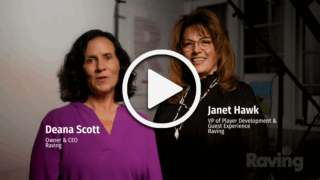
Next week, the Raving team will join over 500 NNAHRA members, speakers and sponsors at the National Native American Human Resources Association (NNAHRA). This annual conference is being held September 23-25, 2019, at the Mystic Lake Resort in Prior Lake, MI. The education focus is on Human Resources, Organizational Development, Employment Law and other issues facing Indian HR Professionals and Tribal Leadership today.
Tribal mentorship and leadership development is near and dear to the heart of Raving and its team members. Through our conferences, speaking events and on-site training, we are committed to building sustainable leadership and business strategies for Tribal organizations; programs that create and support a path for strong Native leaders to run their organizations.
Dan Stromer, Raving Partner, heads our Executive Tribal Development and Operations team and has devoted his career to developing Tribal members and team members for career advancement through his long-term role of GM at a Tribal casino. He now helps Raving clients through our mentorship and leadership program.
We asked Dan recently for his two cents on the top three things that sabotage the best laid development programs. This is what he told us:
1. Management change
“To me, continuity of management is one of the most important factors in a successful program. When leadership is constantly changing direction, the program also changes. The start/stop, start/stop effect on the participants really leaves them dangling in the wind as to what is happening. One group’s philosophy can be completely different than another’s. This does not apply only to the casino management, but the Tribe as well. As Tribal Councils change their opinions of what the programs should be and who is in the program and who is not, it can greatly disrupt the progress. Having a solid plan that is outlined with the goals and objectives, and the ability to stick to it is in everybody’s best interest.”
2. Management’s lack of commitment to the plan
“Too often we hear the term ‘working myself out of a job’ when we are referring to development programs. If that is the case, you are only looking at it from a shortsighted perspective. There will always be a reason why somebody is not ready to be promoted to move into the GM role or other positions. To some extent I understand that concern, but we also know what we signed up for. If management is not committed to putting a plan into place, it has little chance to succeed.
“What is unrecognized in this scenario is how much more valuable that individual is when he or she can do their job and also teach someone else to do it. Recognizing what your skill set is now that you achieved a successful developmental program, and what you can do with it and where you can go, has tremendous opportunities. Unfortunately, too many only look at it from a short-term perspective. The ability to teach others to be successful is a unique skill that will always place you in high demand.”
3. Political
“The elephant in the room that nobody probably wants to bring up can have the biggest impact. Not a day goes by that there is not a political headline that catches our attention on a national level. Developmental programs should have the goal of developing the best candidates to achieve the best results for the long-term interest of the Tribe. Hopefully all decisions are reached on that basis.
“How we choose candidates and leaders to be in these programs should be based on some criteria. Work history and skills, education, knowledge, attitude, work ethic, etc. Taking the personal bias out of that process is important. Ultimately, you are looking at choosing the best people to ensure the long-term success of the operation. That responsibility should not be taken lightly by those choosing or those applying. Because both sides are making a commitment at that point that they are accepting the responsibility to ensure the well-being of the Tribe and its members for generations to come.”
Thanks Dan for your thoughts. Now that you’ve read the top three things that sabotage leadership programs, we won’t leave you hanging! We’ve got solutions for you. Stay tuned for our upcoming complementary article by Paula Allen through our Fall 2019 Tribal Gaming & Hospitality Magazine coming out this October. Or catch Paula in person next week at her live session at NNHARA on Leading Your Team Successfully Through Change: The Tools that Can Best Help Your Team through Disruption, Tuesday, September 24, 2019, 10:15 am – 11:45 am.







